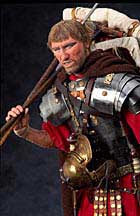
Professor of History
Degrees
- B.A. Latin 1973
- Brooklyn College of the City University of New York
- M.A. Latin 1975
- Bryn Mawr College
- Ph.D. Latin & Greek 1981
- Bryn Mawr College
Awards
Professor-in-Charge, Intercollegiate Center for Classical Studies in Rome (administered by Duke University), 2003-2004.
Member of the Editorial Board, American Journal of Archaeology, 2004-2007
Organizer, Penates, and Steering Board of Multi-Campus Research Group for the Study of Late Antiquity in Southern California, 1998-present
American Council of Learned Societies Travel Grant, 1990
Mellon Fellow in Classical Studies, American Academy in Rome, 1986-87
ACLS Research Fellowship, 1983
Research Area
Ancient Greece & Rome; late antiquity; social and religious history
Publications
On Roman Time: The Codex-Calendar of 354 and the Rhythms of Urban Life in Late Antiquity.
"Because they list all the public holidays and pagan festivals of the age, calendars provide unique insights into the culture and everyday life of ancient Rome. The Codex-Calendar of 354 miraculously survived the Fall of Rome. Although it was subsequently lost, the copies made in the Renaissance remain invaluable documents of Roman society and religion in the years between Constantine's conversion and the fall of the Western Empire.
In this richly illustrated book, Michele Renee Salzman establishes that the traditions of Roman art and literature were still very much alive in the mid-fourth century. Going beyond this analysis of precedents and genre, Salzman also studies the Calendar of 354 as a reflection of the world that produced and used it. Her work reveals the continuing importance of pagan festivals and cults in the Christian era and highlights the rise of a respectable aristocratic Christianity that combined pagan and Christian practices. Salzman stresses the key role of the Christian emperors and imperial institutions in supporting pagan rituals. Such policies of accomodation and assimilation resulted in a gradual and relatively peaceful transformation of Rome from a pagan to a Christian capital. "
Berkeley: University of California Press, 1990.
The Making of a Christian Aristocracy. Cambridge, MA: Harvard University Press, 2002.
"Christian Century : This fascinating and important book...discusses the social origins and career paths of the aristocratic men--and the family involvements of the women--who converted to Christianity, and concludes by exploring 'the emperor's influence on aristocratic conversion' and 'the aristocrats' influence on Christianity'...Salzman's work is important not just for the study of the early church but for the study of the whole history of Christianity. The class distinctions which she so ably explores were significant not only for early Christians, but also for the medieval church and the Reformation church."
--Robert M. Grant
Former Institution
Boston University
Biography
Michele Salzman received her B.A. in Latin (1973) from Brooklyn College of City University of New York and her M.A. (1975) and Ph.D. (1981) from Bryn Mawr College in Greek and Latin. Before joining the faculty at the University of California, Riverside in 1995, she taught at Swarthmore College, Columbia University, and, for thirteen years, at Boston University. Salzman's research focuses on the religious and social history of Late Antiquity. She is author of Roman Time: The Codex-Calendar of 354 and the Rhythms of Urban Life in Late Antiquity (UC Press, 1990), as well as several articles on Roman history and religion. Her new book, The Making of a Christian Aristocracy (Harvard University Press) examined the social and religious issues that bear upon the conversion of the Roman aristocracy from paganism to Christianity in the Roman Empire in the West in the years after Constantine. Salzman is currently interested engaged in a commentary and translation of Book 1 of the Letters of the late Roman senator Symmachus. Salzman was Mellon Fellow in Classical Studies at the American Academy in Rome, 1986-87. In addition, she has received research fellowships from the American Council of Learned Societies, the American Philosophical Society, and the Whiting Foundation. In 2003-2004 she was professor in charge of the Intercollegiate Center for Classical Studies in Rome. She is currently on the editorial Board of the American Journal of Archaeology. She is one of the members of the Steering Committee for the Multi-Campus Research Group for Late Antiquity.
Contact information:
HMNSS Bldg. 6603
University of California
Riverside, CA 92521
(951) 827-1991 (Voice)
(951) 827-5299 (Fax)
(951) 827-5401 (Dept)




